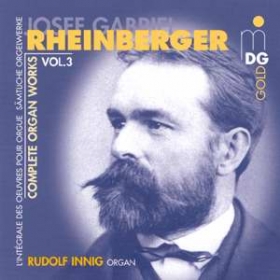
MDG 317 0893-2
Rudolf Innig, Orgel
Walcker Orgel Stadtkirche Winterthu
Josef Rheinberger (1839-1901)
Complete Organ Works Vol. 3
Sonatas No. 5-6 12
Fughetten op. 123a
Excerpts from the booklet
During the late 1870s Rheinberger also began writing organ compositions on a very regular basis - even though the disablement of his right hand meant that he himself could no longer play the organ in public. He composed his Organ Sonata No. 5 in 1878, and from then on one sonata or concerto for organ followed almost every year. He also wrote some more comprehensive collections of shorter compositions – without our being able to identify a concrete occasion for these compositions. (Dr. Irmlind Capelle)
Excerpts from the reviews
“Rudolf Innig’s playing is ideal for this music, romantic and yet never damaging to the structure of the works; and to hear the music played on an instrument of the composers own time is an enlightening and inspiring experience. Highly recommended! (The Organ, 2001)
“Innig’s pilgrimage through Rheinberger’s organ works arrives at some of the composer’s most intense, broodingly chromatic writing in these two sonatas. His flowing, characterful playing finds a natural home here, and the sonatas contrasts well the dark intensity of the outer movements with the inner ones’ lighter shades. Adequately recorded. (BBC Music Magazine, 2001)
»Titulaire d’une vaste discographie romantique et symphonique chez MDG Rudolf Innig est en train de graver la plus belle intégrale Rheinberger à ce jour. L’interprétation de Rudolf Innig est tout simplement magistrale, magnifiquement orchestrée, digne reflet de l’esprit pondéré du compositeur mais aussi de sa flamme, de tendance classique mais ardente » (Diapason, 2001)
« Las versiones de Rudolf Innig como en los voluméres antiores, resultan equilibradas y estilicamente adecudas. Incide en los aspectos más musicales y, quizás, se deja arrastrar por una dosis excesiva de pirotecnica instrumental, pero es un borrón mínimo en una apuesta tan meritoria. (Scherzo, 2001)

